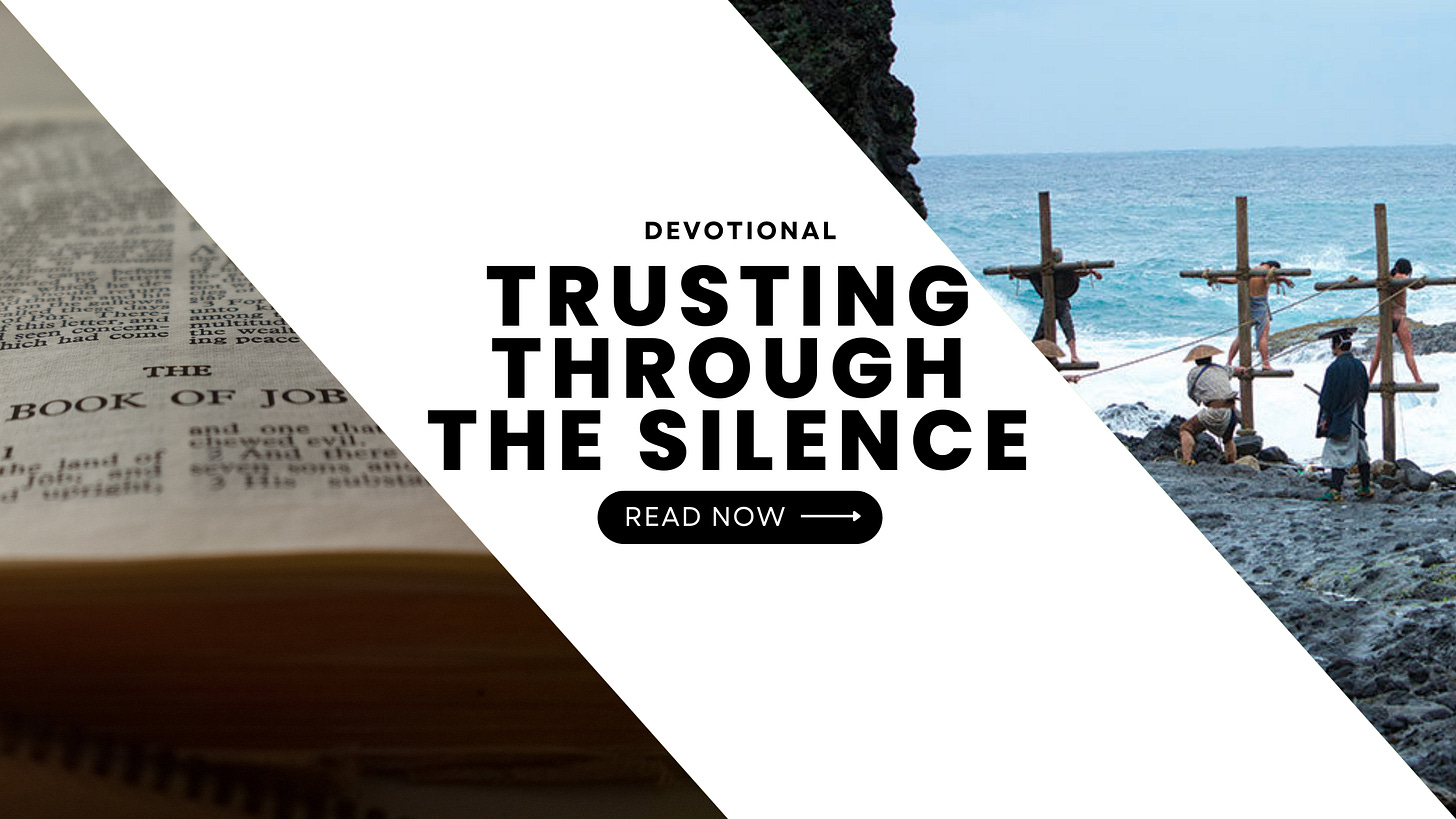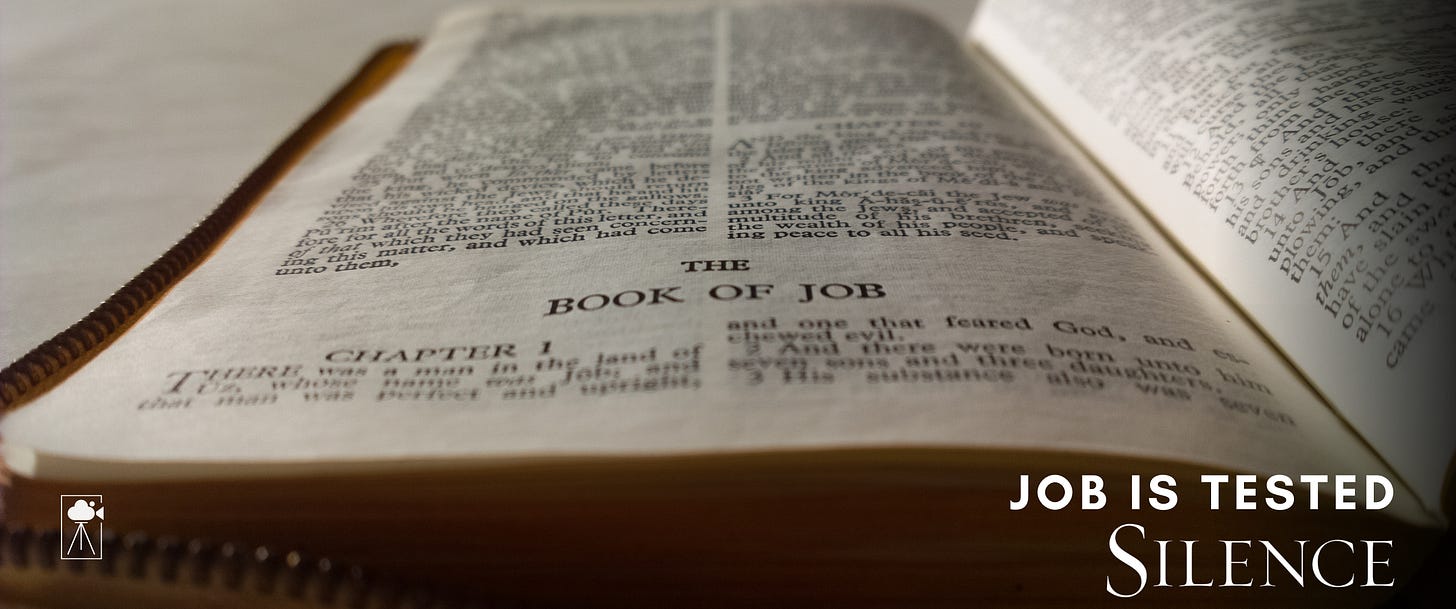Trusting through the Silence
A book of the Bible, a Martin Scorsese film, and God's silence...
“Just listen to God.”
“Have you asked God for an answer?”
“Read the Bible and you’ll know what God wants you to do.”
Christians love to prescribe ready-made advice like this to their fellow believers when they’re going through a rough patch. And it’s all out of good intent - we should listen to God, and God does provide us with answers, both through His Word and through the Holy Spirit.
The problem is, advice like the above ends up sounding more like a self-help book than actual spiritual guidance, and it all tries to prescribe a ready-made solution to all situations. Why would we assume that a God beyond all comprehension will work in the same way in every situation?
It seems like we’re often met with silence when we have questions. What new career should I choose when every option I find has downsides? Why did my family fall apart, despite every attempt at reconciliation? Why did I lose an opportunity I so clearly thought I was called to?
I don’t have those answers, and no one truly will. But I love meditating on how countless others have dealt with these same questions throughout time.
The Story of Job
Job was a wealthy man, described in the Bible as “a truly good person, who respected God and refused to do evil.” One day Satan appears to God in heaven, and claims that Job is only so righteous because of his wealth. He claims that if Job were punished, he would curse God. God allows Satan to punish Job and Job loses everything. His servants and his children are killed, and he loses all his possessions. He breaks out in skin sores. Although he won’t curse God, he can’t understand why God would do this to him. He doesn’t understand God’s silence.
Though I pray to be rescued from this torment, no whisper of justice answers me.
Later Job grows even more desperate, saying in Job 30 and 31:
I beg God for help, but there is no answer; and when I stand up, he simply stares. When I beg for relief and light, all I receive are disaster and darkness. Why doesn't God All-Powerful listen and answer? If God has something against me, let him speak up!
Job’s entire life had been dedicated to serving God, and yet he’d lost everything. His riches, his health, even his family. Even having lost all of that, Job won’t curse God. But he can’t understand why God won’t answer Him. What could possibly be the reason for all his suffering?
Martin Scorsese’s Silence
Martin Scorsese has always tried to reconcile his thoughts on the Christian faith through film. Whether through the controversial The Last Temptation of Christ or even through spiritual allusions in films like The Irishman, Scorsese seems to be giving audiences a glimpse into his own struggles with faith and his ultimate reconciliation with those struggles.
2016’s Silence was a return to overtly spiritual themes for the director, the story of two 17th-century Jesuit priests who travel from Portugal to Japan to locate their missing mentor and spread Christianity. The story is set amidst the persecution of Christians that occurred under the Japanese government.
The protagonist, Rodrigues, is searching for Father Ferreira, but during his search he encounters several hidden Christian communities, and witnesses the horrors these communities endure. He watches from a distance as Japanese Christians are murdered and voices his thoughts to the audience:
Surely God heard their prayers as they died. But did He hear their screams? I prayed that He might reach out to them, but how can I explain His silence to these people who have endured so much? I need all my strength to understand it myself. Humanity is so sad, Lord, and the ocean so blue.
How can Rodrigues explain God’s silence? He’s sharing the “good news” with the people of Japan, but everyone that accepts the Gospel is enduring endless suffering, with seemingly no word from the God they just devoted their life to.
Rodrigues continues his journey and grows increasingly disheartened, desperate to hear God’s voice. He sees embers of a fire, birds fly alongside him, and he contemplates if God is speaking to him, or not at all.
“Is this Your sign that I am not alone? Or is this Your sign? Or no sign at all? I expected Your silence, but the weight of it is terrible. God, lend me the strength to be worthy of this trial and to remain faithful to Jesus. Despair is the greatest sin, but in the mystery of Your silence, it crowds my heart.
Much like Job, Rodrigues is trying to stay steadfast in his faith, but he begins to despair, not understanding God’s silence. It’s a timeless concern. Why does God let bad things happen to good people? If God was real, why does he let pain and suffering occur in the world? Can’t he at least give Job or Rodrigues or me an answer? Rodrigues thinks back to Christ on the cross, remembering that even then God was silent.
His sweat became like drops of blood, Eloi, Eloi, lama sabacthani...why have you forsaken me. Your Son’s prayer on the cross. A cry of fear and despair. You were silent. Even to Him.
I won’t spoil the events of the film, and at a runtime of nearly 3 hours, I couldn’t adequately describe the full events if I wanted to. But towards the end, Rodrigues has yet another internal monologue, but this time he hears Christ’s voice.
Rodrigues: Lord, I fought against Your silence.
Voice of Jesus: I suffered beside you. I was never silent.
Rodrigues: I know. But even if God had been silent, my life...to this very day...everything I do...everything I’ve done...speaks of Him. It was in the silence that I heard Your voice.
Closing Thoughts
“It was in the silence that I heard Your voice.” I’m not going to write that “if you just listen, you’ll hear God.” Job fasted and didn’t speak for 7 days, and God was still silent. Rodrigues quietly watched all kinds of torment, desperately hoping to hear from God, and he didn’t. But I am fascinated that Scorsese’s ultimate conclusion is that the only way we might hear God’s voice is in the silence.
And even more interesting? The book of Job carries hints of that as well. After over 30 chapters of arguing with his friends and calling out to God, Job 31 ends by saying, “After saying these things, Job was silent.” And while God’s response isn’t immediate, it’s in the silence that he hears God’s voice, starting in Job 38.
It’s funny, the oft-maligned Christian advice of “just listen to God” really is what all of these examples points to. But what is rarely offered alongside that advice is this: even if you listen to God, even if you’re silent and await his answer, it may not come. Even if you’re silent and listening, you may be met with God’s silence.
But even if God is silent, our lives - everything we do and everything we’ve done - should speak of Him. And then, somewhere in the silence, I pray that we’ll hear God’s voice.





